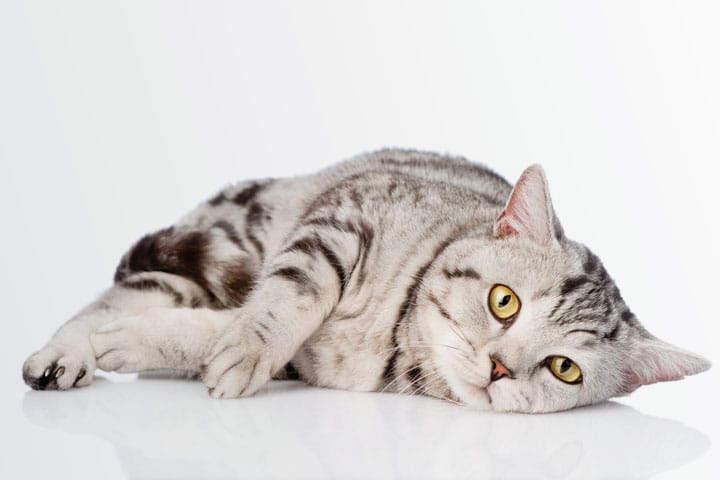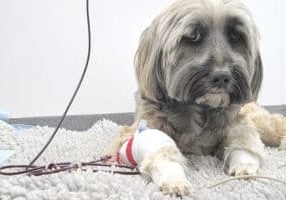
Hyperthyroidism and chronic kidney disease (CKD) are common conditions in older cats, so it is not terribly surprising that they can occur in the same patient. Hyperthyroidism “artificially” increases renal blood flow and glomerular filtration rate, potentially therefore masking renal insufficiency. Following therapy, when euthyroidism is restored, the true state of the cat’s renal function will be appreciated. Unfortunately predicting the development of azotaemia in this situation is difficult.
It has been historically recommended that immediately following hyperthyroidism diagnosis, medical treatment is selected initially, so that in cases where azotaemia is “unmasked”, the medical therapy can be scaled back, to minimise the azotaemia if it develops. In a UK based study of 600+ primary care vets by Higgs et al, more than 50% of respondents reported that in the presence of azotaemia, they would aim for a thyroxine concentration in the upper half of the reference range, or above, when using anti-thyroid medications.
It has also been suggested that when azotaemia is “unmasked”, definitive treatment for the hyperthyroidism (surgical thyroidectomy, radioactive iodine) should not be pursued, due to concerns about poor long-term prognosis. It has however been shown that the prognosis for euthyroid non-azotaemic and “unmasked” azotaemic cats is the same. CKD is often a slowly progressive condition, and only around a third of geriatric patients with CKD will die of causes related to this. Given this data, there is no reason for well-compensated azotaemic cats with controlled hyperthyroidism not to be considered for definitive therapy such as thyroidectomy or radioactive iodine.
Given the lack of survival difference between non-azotaemic and “unmasked” azotaemic cats with controlled hyperthyroidism, there is no sensible reason to “under-treat” these cats. Hyperthyroidism is associated with catabolism and a tendency to volume overload (and thus congestive heart failure). There is also suggestion that hyperthyroidism may actually promote progression of renal disease by causing glomerular hypertension, hyperphosphatemia, glomerulosclerosis and proteinuria; even more reason not to “undertreat” cats with “unmasked” azotaemia!
A key factor when considering the care of hyperthyroid cats with unmasked renal disease is hypothyroidism. Hypothyroidism in cats has been historically disregarded, in part because it is rarely associated with the overt signs of lethargy and coat change commonly seen in hypothyroid dogs. It is now recognised that hypothyroidism causes important biological effects in cats, in particular, reduced glomerular filtration rate (GFR) and thus higher creatinine concentrations. 2/3rd of cats with “unmasked” azotaemia after hyperthyroidism treatment are hypothyroid in some studies. The presence of hypothyroidism alongside CKD in treated hyperthyroid cats confers a significantly worse prognosis to affected cats. Supplementation of thyroxine in hypothyroid cats typically reduces creatinine concentrations by 20%, and in one study rendered 50% of these patients non-azotaemic. In a small scale study by Peterson et al, thyroxine supplementation significantly improved survival time in cats with hypothyroidism and azotaemia, versus those who were not supplemented.
Given the importance of hypothyroidism in treated hyperthyroid cats, particularly those with azotaemia, it is important to be able to recognise it. Frustratingly, thyroxine is a poor indicator of hypothyroidism in cats. In the Peterson et al study, total T4 was low in 54% hypothyroid cats, and free T4 was low in only 25% of cats. TSH was elevated in all hypothyroid cats, and no other cats (including cats with chronic kidney disease, where euthyroid sick syndrome may complicate things). The current situation suggests that elevated TSH is supportive of hypothyroidism. In a cat with azotaemia, it would be wise to reduce anti-thyroid medication dose/ supplement with oral thyroxine if post-surgery/I-131, with the aim of normalising the TSH, and thus maintaining GFR and optimising renal function.
Take home message:
- Do not be tempted to under-treat hyperthyroidism when azotaemia is unmasked; this approach is likely deleterious to the cat, and potentially it’s kidneys too
- Hypothyroidism is common after radioactive iodine, bilateral thyroidectomy, and with anti-thyroid medication. Two thirds of cats with “unmasked” azotaemia after hyperthyroidism treatment have been shown to be hypothyroid
- Hypothyroidism is best detected with TSH assessment- do not rely on TT4 or FT4, as often these results are not low in cats with confirmed hypothyroidism
- Hypothyroidism should be considered in all cats treated for hypothyroidism, and steps taken to avoid it (reduce anti-thyroid medication dose, or supplement with thyroxine if post-surgery/ radioactive iodine).
References:
P. Higgs, J.K. Murray and A. Hibbert. Medical management and monitoring of the hyperthyroid cat: a survey of UK general practitioners. (2014). Journal of Feline Medicine and Surgery 16(10): 788–795
M.E. Peterson, R. Nichols and M. Rishniw. Serum thyroxine and thyroid stimulating hormone concentration in hyperthyroid cats that develop azotaemia after radioiodine therapy. (2017). Journal of Small Animal Practice 58: 519–530
H.H. Vaske, T. Schermerhorn and G.F. Grauer. Effects of feline hyperthyroidism on kidney function: a review. (2016). Journal of Feline Medicine and Surgery 18(2): 55–59
T.L. Williams, K.J. Peak, D. Brodbelt, J. Elliott, and H.M. Syme. Survival and the Development of Azotemia after Treatment of Hyperthyroid Cats. (2010). Journal of Veterinary Internal Medicine 24: 863–869.
T.L. Williams, J. Elliott, and H.M. Syme. Effect on Renal Function of Restoration of Euthyroidism in Hyperthyroid Cats with Iatrogenic Hypothyroidism. (2014). Journal of Veterinary Internal Medicine 28: 1251–1255
Case Advice or Arranging a Referral
If you are a veterinary professional and would like to discuss a case with one of our team, or require pre-referral advice about a patient, please call 01883 741449. Alternatively, to refer a case, please use the online referral form
About The Discipline
Internal Medicine

Need case advice or have any questions?
If you have any questions or would like advice on a case please call our dedicated vet line on 01883 741449 and ask to speak to one of our Internal Medicine team.
Advice is freely available, even if the case cannot be referred.
Internal Medicine Team
Our Internal Medicine Team offer a caring, multi-disciplinary approach to all medical and surgical conditions.